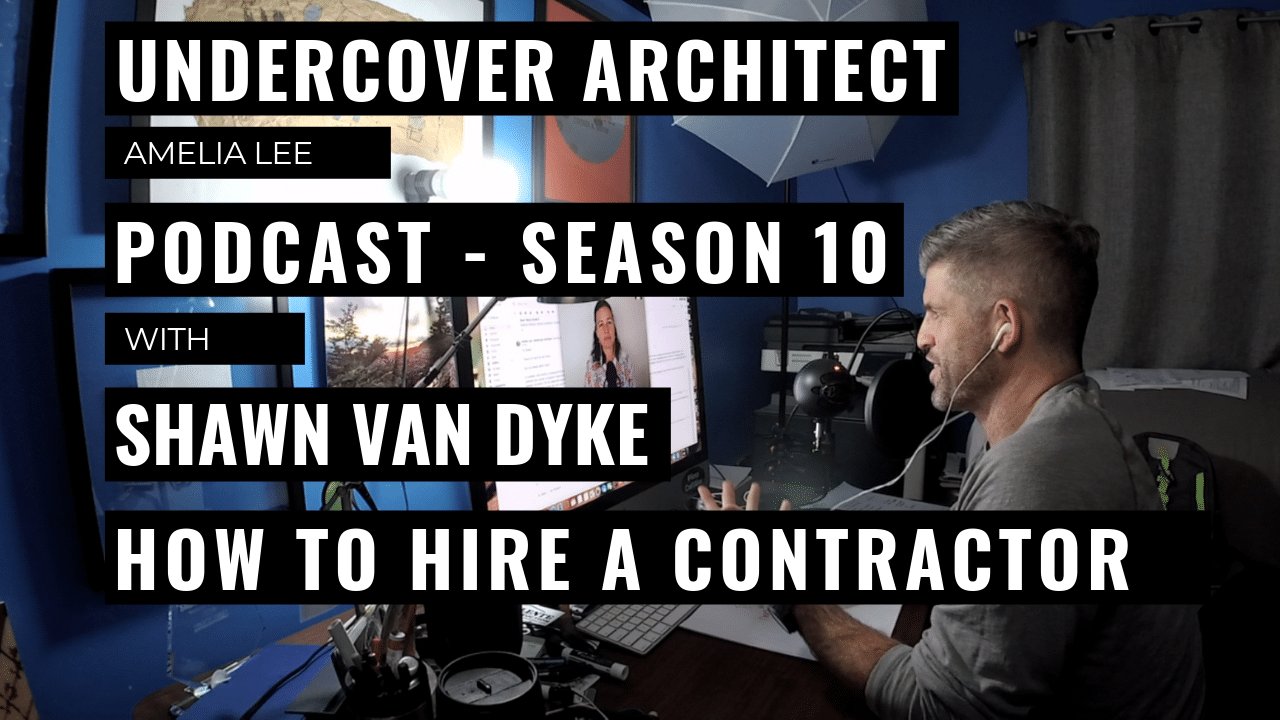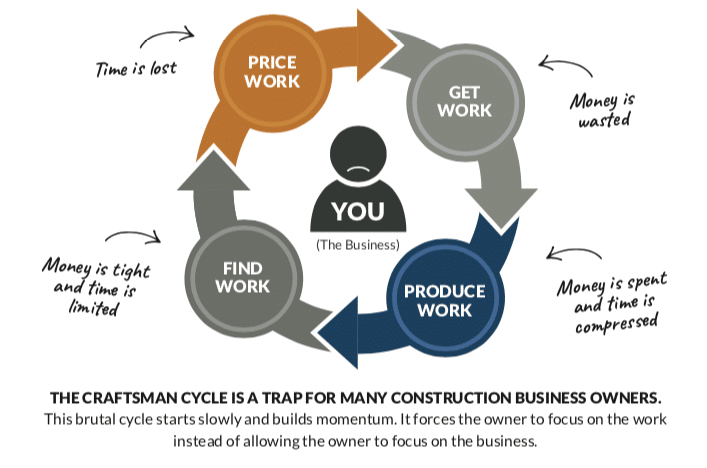Built to Build: Blog
WHY CONTRACTORS SHOULD CHARGE FOR PROPOSALS

CHARGING FOR PROPOSALS SERVES YOUR CUSTOMERS
Many residential contractors waste their time by running around giving out free estimates to customers who never intend on hiring them. This practice increases the cost of a project because someone has to pay for that wasted time. If a contractor doesn’t recover those costs, then they will end up working for unqualified customers on unprofitable projects. Working for the wrong customers on projects that don’t produce a profit keeps contractors trapped in The Craftsman Cycle(TM).
THE CRAFTSMAN CYCLE(TM)
The Craftsman Cycle(TM), as described in my latest book, Profit First for Contractors, is the seemingly never-ending loop of urgent tasks and responsibilities that keep contractors from gaining traction toward their important goals.
The solution to breaking this cycle of price work, get work, produce work, and find work starts by pre-qualifying your potential customers.
The best way to pre-qualify your potential customers is to charge them for the work they want you to do.
If they aren’t willing to pay for the work you do, then they aren’t a good fit for your business.
WHAT IS AN ESTIMATE?
As I describe in my first book, The Paperwork Punch List: 28 Days to Streamline Your Construction Business, an estimate is:
– a guess based on experience.
That’s it.
And, if your potential customers can provide you with a decent description of their projects, then you should be able to give them an estimate over the phone.
If they can’t give you a detailed description of what they want, then they need your professional services to help them determine the budget and scope of work.
These professional services take time to produce, and that’s why you must charge them.
If you don’t charge them for the work you do, and they decide not to hire you, then who pays for your time?
ANSWER: The customers who do decide to hire you.
In my opinion, that’s not right.
You should be rewarding the customers who decide to hire you, not penalizing them for your ability or inability to sell other potential customers on your services.
FREE ESTIMATES ARE NOT FREE.
Are you sick and tired of wasting your time, giving away your work for free to customers that will never pay you enough to make a profit?
If the answer is “YES”, then you need to enroll in my PAID for PLANNING training program.
Sign up here and you’ll receive a FREE VIDEO training and learn the 3 steps to pre-qualifying your clients and getting PAID for PLANNING.
HOW TO CHARGE FOR PROPOSALS
I recently appeared on Episode 5 – Season 10 of The Undercover Architect and discussed with the host, Amelia Lee, how contractors can charge for their pre-construction services.
Below is a [VIDEO] of part of our discussion where we discuss what a homeowner should expect from a professional contractor. I give an example of the type of conversation a homeowner and contractor should have before they enter into a service agreement.
(You can listen to the entire episode here.)
=====
BEGIN TRANSCRIPT
=====
Amelia Lee:
What do you say the benefits are for contractors basically being paid for their quotes and their estimates?
Shawn Van Dyke:
Yeah. I’ll explain to you like this, especially when I was running my construction business. It was just a small residential remodeling company, and this was one of those things that I kind of just stumbled… We were talking earlier. This is one of those things I stumbled across. It wasn’t like I started my business and I had this system in place, and because I’m all that smart. I was really just… As I said, I was just too dumb to know any different, then eventually kind of figured it out. But what I would tell homeowners, when I was talking to homeowners, and said, “Okay, well we’ll…” And we’ve talked about their… or we’ve talked about… they’ve described their project to me. I said, “Okay, well what’s your budget?” And they may or may not tell me their budget, and if they didn’t, that’s okay. I would give them a number, and say, “Well, it sounds like the project you were describing…”
For example, let’s say it was $100,000, and they would say, “Well, we’re not going to spend $100,000.” I say, “Well, great. Two seconds ago, you didn’t know what the budget is, and now we know it’s not $100,000,” so then I would say, “Okay, well how does $90,000 sound?” “Well, we’re not going to spend that either,” and eventually we’ll get to a number that they would say, “Okay, well we have 75,000 in our budget.” “Great. That is not a problem for us, because we do that all the time. The project you described is a $100,000, so if any contractor says that they could do it for 75, they’re either ignorant or they’re incompetent, so this may not be the right project for us, because you described a $100,000 project, but you only have 75.
“The way that we can help you with that is that you would hire us to come in and work with you, to help you make some selections and maybe change some things around to get it down to that $75,000. That’s going to take a lot of work. We’re going to meet several times over the next couple of weeks, and we’re going do drawings, and we’re going to do all of this kind of stuff, but that is work, and we’re going to help you get there, and we can build you a $75,000 project, no… In fact, we’re probably going to plan for $65,000 project and build in $10,000 in contingency, because things will change, and we’re so professional at what we do, we can predict the future. We know that you’re going to upgrade some things and want to have some other…”
It’s that kind of conversation that I would have with the homeowner, and I would just… So someone that doesn’t agree with that, a homeowner that says, “Well, I’ve talked to three other contractors, and they’ve already given me a price, and your estimate, what you’re telling me, is already 30% higher than them.” Then I would say, “Oh, you’ve already talked to three people, and they’ve given you a number. Let me ask you, why haven’t you hired them?” And homeowners that are listening out there, you will never answer that question, and I understand that, but here’s why. Here’s the answer to that question 100% of the time. If someone has given you a number to do a scope of work, and you haven’t hired them, it’s because you don’t trust them. So when you’re comparing me as 30%, 20% higher than someone you don’t trust, it doesn’t really make sense.
Then I will go in to explain to the homeowner… And sometimes, you know, people get a little offended sometimes, but that’s why you kind of got to walk through it very slowly. I’ll say, “Okay, let’s imagine this, that I go out and I look at 10 projects,” and me as speaking as the contractor. “I go out and I look at 10 projects, and I spend time putting it together for everybody, and I get three of them. That’s a 30% closing rate, which isn’t too bad for a remodeling contractor.” Then I would ask the homeowner, “Who pays for the other… the seven that I don’t get?” And oftentimes, you’ll get a response, “Well, that’s just the cost of doing business,” and I love it when they say that. I’ll say, “You’re exactly right. It is the cost of doing business, and who pays for that cost?” Sometimes, they don’t know kind of where I’m going, or sometimes they say, “Well…” and here’s the answer to that. It’s the three people that hired me to do the work.
So, I feel like if I don’t charge for my proposals, then I’m overcharging the people that I should be rewarding for hiring me. So I’ll say, “That’s why we charged for proposals, because your job should cost exactly what your job should cost, and it shouldn’t depend on my ability or inability to sell anybody else. So that’s why we have to charge you to do this work.” So they say, “Well, you’re going charge me to come out and give an estimate?” That’s where I kind of back up and say, “No, we just gave you an estimate. It sounds like it’s about $100,000. We’re professionals, and we do this all the time. It could certainly be 90, it could certainly be something else, but that was your estimate, and we didn’t charge anything for that. To come out, to meet with you, to develop a scope of work, to do all of stuff, well that’s work, and we get paid to do work.”
Then that’s where I get, “But, if you hire us to do that work, here’s the process we’ll follow, and here’s the experience that you’ll have.” Some people get very offended at that, because contractors are supposed to work for free, and those are the type of homeowners that are going to put other contractors out of business, so let them go do that for somebody else.
=====
END TRANSCRIPT
=====
BECOME PERMANENTLY PROFITABLE TODAY
If you want help streamlining your construction business and making it permanently profitable, then go grab my book, Profit First for Contractors.
You can get it on Amazon. It’s on Kindle. It’s on Audible. It’s everywhere.
Download the free resources and sign up for the free video training when you sign up to receive the PFC Bonus Tool Box.
Make your construction business permanently profitable this year.
IMPROVE YOUR CONFIDENCE AS A CONSTRUCTION BUSINESS OWNER
Do you want to make more money, streamline your construction business, and get your life back?
If the answer is “YES,” then sign up for one of my coaching programs.
Click here and fill out the application. My team will follow up with the next steps.
GET YOUR COPY OF PROFIT FIRST FOR CONTRACTORS
Remember to go buy my book, it’s on Amazon, it’s on Audible, it’s on Kindle, it’s everywhere, Profit First for Contractors.
If you want to streamline your construction business and DOUBLE your profits next month…
download my FREE book: The Paperwork Punch List

Shawn Van Dyke is a construction industry consultant, business coach, and mentor to construction business owners. He is a Brand Ambassador for Fine Homebuilding, travels across the US as a keynote speaker, seminar presenter, and the author of two books – Profit First for Contractors and The Paperwork Punch List: 28 Days to Streamline Your Construction Business.
WANT SHAWN TO SPEAK AT YOUR EVENT OR TRAIN YOUR TEAM?

